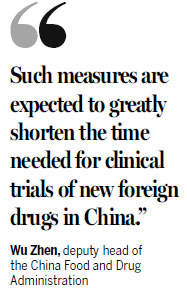Faster approval for foreign drugs eyed
By Wang Xiaodong (China Daily) Updated: 2015-08-19 07:45
Procedures to approve the use of new overseas drugs in China are to be improved.
Such drugs can be given clinical trials on the Chinese mainland at the same pace as for trials conducted overseas, after approval from China's top drug regulator, according to a guideline released by the State Council on Tuesday.
The guideline also says that domestic clinical trial institutions are encouraged to take part in trials conducted by their international partners to enable the data acquired to be used when the overseas developers apply to register the new drugs in China.
"Such measures are expected to greatly shorten the time needed for clinical trials of new foreign drugs in China, so they will enter the country more quickly," said Wu Zhen, deputy head of the China Food and Drug Administration.
Some innovative foreign drugs are only available in China five years after they appear overseas, with the delay caused by many reasons, Wu said.
About 21,000 new types of drugs, both from home and abroad, are awaiting approval from the administration, which has the sole power to approve new drugs entering China. However, it is severely short-staffed, Wu said.
The current laws also include some restrictions on the inflow of foreign drugs to China, he said.
Innovative drugs from overseas can only enter the domestic market after clinical trials on their safety and effectiveness are completed in China, even though they have been approved by other countries, he said.
"The measure is aimed at ensuring foreign drugs can be used safely on Chinese people, as a drug may have different effects on different people," Wu said.
The new guideline allows a foreign drug to undergo clinical trials in its home country and in China at the same pace. The data collected will be valid during the registration of such drugs in China, he said.
Clinical trials of a new foreign drug in China normally lag behind the clinical trials of the drug in its home country, Wu said.

"For example, a drug developer from overseas can only apply for the second phase of a clinical trial of the drug in China after this phase has already been completed in the foreign country and it is proven to be safe and reliable," Wu said. "Such regulations are well meant, but in reality greatly delay the application of such drugs in China."
The administration will speed up approval procedures for new drugs that are badly needed in China, including those from overseas, while ensuring the safety and effectiveness of every drug that is approved for the domestic market, he said.
Many innovative drugs that have proved effective in curing critical diseases are not available in China because of lengthy registration and approval procedures, medical analysts said.
On World Hepatitis Day on July 28, Bernhard Schwartlander, the World Health Organization representative in China, called for quicker approval of new overseas drugs that have been much more effective in curing hepatitis C than those used in China.
He said this would enable millions of Chinese patients to have better treatment.
wangxiaodong@chinadaily.com.cn
(China Daily 08/19/2015 page5)
- Delegation salutes Tibet anniversary
- Officials are told to act as anti-graft watchdogs
- Great Wall safeguarded in united action
- Vice minister pledges more efforts to improve air quality
- Beijing’s efforts to control air pollution start to pay off
- China's military committed to reform
- Netizens rip singer over baby photos
- Central govt's growing support for Tibet
- Monument to be built on Tianjin blast site
- China and Russia seal raft of energy deals







